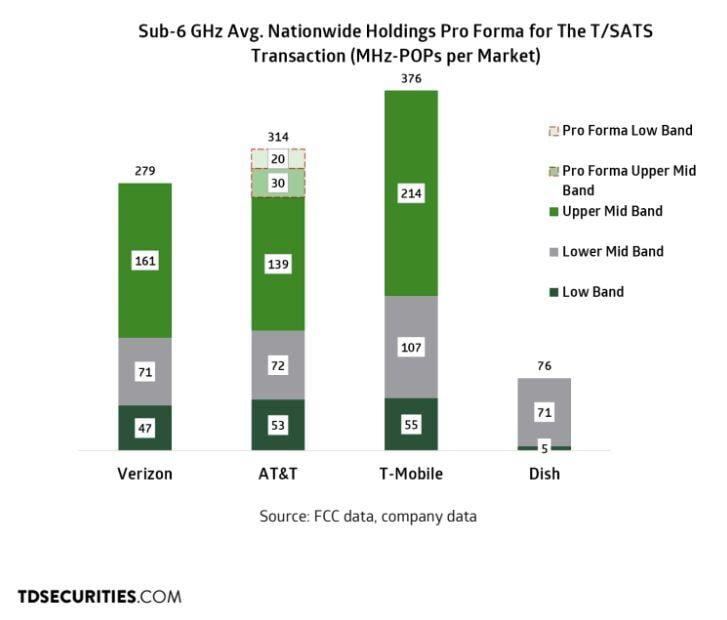- Analysts think EchoStar’s remaining spectrum will likely be put up for sale
- SpaceX and T-Mobile have reportedly expressed interest in buying
- EchoStar may keep some 2 GHz/AWS-4 spectrum for its direct-to-device ambitions
AT&T’s $23 billion EchoStar transaction is set to further consolidate the wireless market, relegating the idea of four national U.S. carriers to the dustbin. But there are still gains to be milked from EchoStar’s remaining holdings, analysts told us.
Here’s the current lay of the land. As part of the deal, AT&T will get a 30MHz chunk of mid-band 3.45GHz spectrum as well as a 20MHz swath of low-band 600MHz airwaves, bringing its overall spectrum holdings to 314MHz, per TD Cowen. The deal gives AT&T a leg up on Verizon, but T-Mobile will still reign supreme with a total of 376MHz at its disposal.

All told, EchoStar will have about 76MHz of leftover spectrum, and analysts believe another sale is imminent as the company transitions to a “hybrid” MNO relationship with AT&T.
“The deal suggests that substantial demand exists for additional EchoStar spectrum licenses...including its paired AWS-3 licenses,” said Octus Research’s senior TMT analyst Adam Rhodes in a research note.
AT&T CEO John Stankey also hinted more EchoStar transactions are on the horizon, as he said on Tuesday’s call, “I’m really happy that we’re first out of the shoot.”
As far as analysts are concerned, EchoStar doesn’t have much incentive or reason to hold onto the spectrum any longer. The company for years has pursued a “spectrum speculation strategy,” said Mobile Experts Principal Joe Madden. Consequently, it’s never invested enough to “build a viable network” in any of its bands.
“Now that they have finally scored a win, I believe that they will need to sell the remaining spectrum soon,” he told Fierce. “Their story of becoming the fourth big operator is unraveling and is no longer remotely credible.”
Techsponential Founder Avi Greengart similarly thinks the remaining assets will be sold “or potentially regulated over” by the Federal Communications Commission “to someone who needs it.”
Who will grab EchoStar’s leftovers?
As for who might scoop up the leftover spectrum, Verizon and SpaceX are two possible candidates, Madden noted. SpaceX has been quite vocal about its desire to get hold of the 2GHz/AWS-4 spectrum, which is probably the “next most valuable spectrum [EchoStar] own[s],” said AvidThink Principal Roy Chua.
The bidding war seems to already be on. Semafor reported SpaceX and T-Mobile have separately expressed interest in EchoStar’s leftover spectrum coffers. T-Mobile is still in talks about some of the pieces AT&T didn’t buy, according to people familiar with the matter.
“It's most likely that other MNOs could bid for the spectrum, or that EchoStar retains some of that for [direct-to-device satellite] services while leasing some of it to other MNOs on a market-by-market basis,” Chua added.
For now, at least, the 2GHz/AWS-4 band will play a role in EchoStar’s D2D ambitions. The company and MDA Space plan to use a swath of that spectrum to build a constellation of 200 satellites, through which EchoStar hopes to eventually offer global talk, text and broadband services directly to standard 5G non-terrestrial networks (NTN) handheld devices.